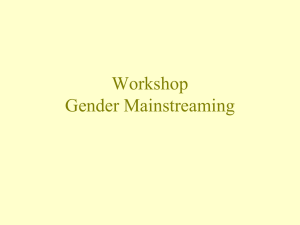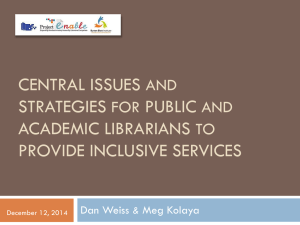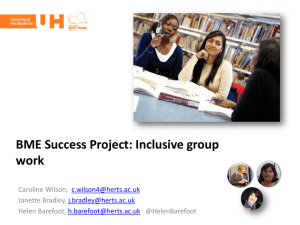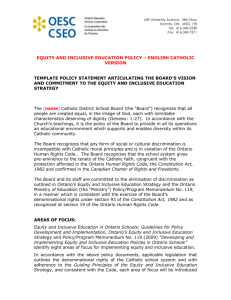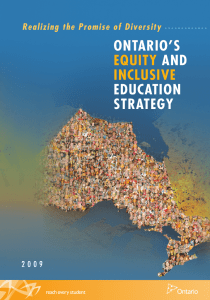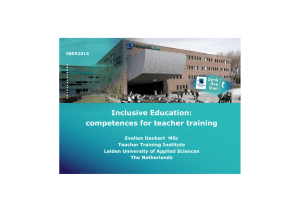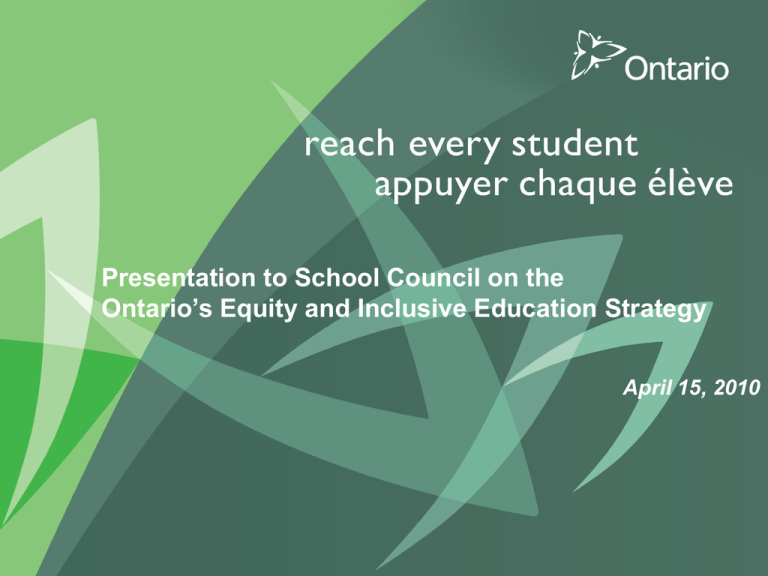
PUT TITLE HERE
Presentation
to School Council on the
Ontario’s Equity and Inclusive Education Strategy
April 15, 2010
1
Purpose of Meeting
_____________________________________________________
The purpose of the meeting today is to provide you with an overview
of the equity and inclusive education strategy and Ministry and
School Board action items.
Key Action Items
• LKDSB is in the process of developing a policy on equity and
inclusive education including a guideline on religious
accommodation for implementation by September 2010.
• The implementation phase will be done over a period of four
years (2008-2009 to 2011-2012).
2
Introduction
___________________________________________
• There is a direct link between success at school at school and a
school’s learning environment. (Safe Schools Action Team, 2008).
• Rejection, exclusion and estrangement are associated with
behaviour problems in the classroom, lower interest in school, lower
student achievement, and higher dropout rates. (Osterman 2000).
• Positive results of a genuine partnership between parents and
schools include improved student achievement, reduced
absenteeism, better behaviour, and increased public confidence
among parents in their children’s schooling.
3
Definitions
____________________________
• Diversity: The presence of a wide range of human qualities and
attributes within a group, organization, or society. The dimensions
of diversity include, but are not limited to, ancestry, culture, ethnicity,
gender, gender identity, language, physical and intellectual ability,
race, religious, sex, sexual orientation, and socio-economic status
• Equity: A condition or state of fair, inclusive, and respectful
treatment of all people. Equity does not mean treating people the
same without regard for individual differences
• Inclusive Education: Education that is based on the principles of
acceptance and inclusion of all students. Students see themselves
reflected in their curriculum, their physical surroundings, and the
broader environment, in which diversity is honoured and all
individuals are respected.
4
Embedding the Principles of Equity
____________________________________________
The Ministry is embedding the principles of equity and inclusive
education within its initiatives such as:
•
•
•
•
•
•
The Ontario Curriculum
Student Success
The School Effectiveness Framework
The Operational Review Guide
Request for Proposal for Teaching Practices etc.
Implementation of the OPS Diversity Strategy within the
Ministry
• Presentations including community outreach
e.g. Faculties of Education, Ontario College of Teachers,
Boards and other organizations (Ontario Police College)
• Participation in evidence-based research
5
Policy Development
________________________________________________________
• A boards’ equity and inclusive education policy is expected to be
comprehensive, cover the prohibited grounds of discrimination set
out in the Ontario Human Rights Code and may include other similar
factors (e.g. socio-economic)
– Grounds may be related to ancestry, culture, ethnicity, gender, genderidentity, language, physical and intellectual ability, race, religion, sex,
sexual orientation, or other similar factors
6
Vision
________________________________________________________
Equity and inclusiveness are internationally recognized as critical to
the delivery of a high quality education in a global, knowledge-based
economy (UNESCO, 2008).
The Ontario’s Equity and Inclusive Education Strategy (2009) sets
out a vision for an equitable and inclusive education system where:
• all students, parents and members of the school community are
welcomed and respected,
• every student is supported and inspired to succeed in a culture
of high expectations for learning.
7
Guiding Principles of the Equity and Inclusive
Education Strategy
________________________________________________________
Equity and inclusive education:
•
•
•
•
•
•
•
is a foundation of excellence;
meets individual needs;
identifies and eliminates barriers;
promotes a sense of belonging;
involves the broad community;
builds on and enhances previous and existing initiatives;
is demonstrated throughout the system.
8
Goals
__________________________________________
Realizing the Strategy’s vision depends on the effective
implementation of the Strategy’s three goals:
1. Shared and committed leadership
2. Equitable and inclusive education policies and
practices
3. Accountability and transparency
9
Implementation Plan
___________________________________________
The implementation phase will occur over a period of four years
(2008-2009 to 2011-2012). This year (2009-10) is the second year
of implementation.
By September 2010, boards will implement their policies on equity
and inclusive education including a guideline on religious
accommodation.
10



